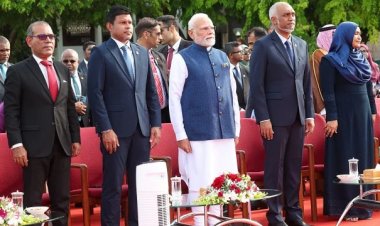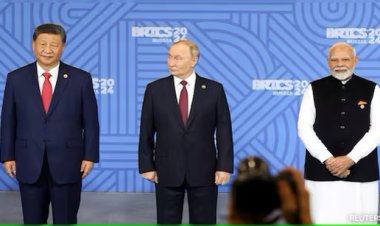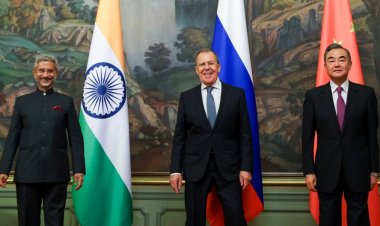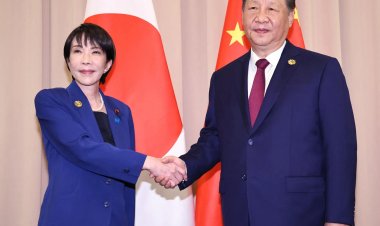Japan's East Asian and Indo-Pacific Challenges
Numerous challenges await as Japan attempts to beget and build, constitute and characterize, and design and develop a host of existent and new partnerships in the Indo-Pacific.
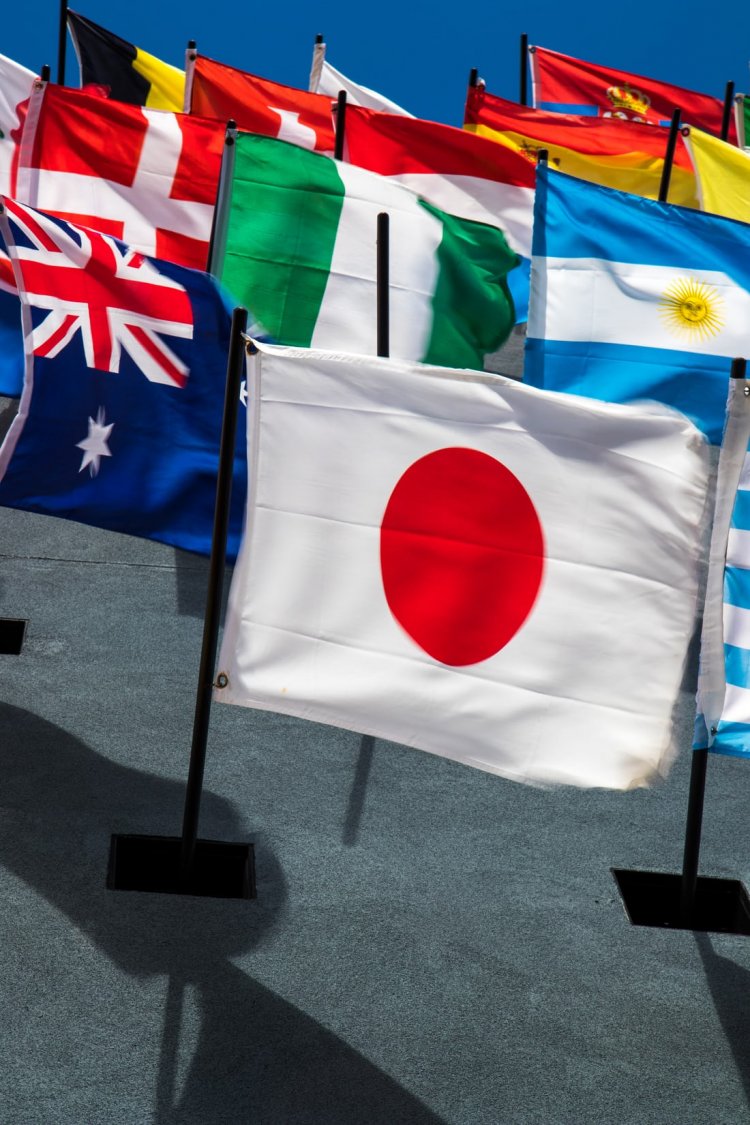
Commentary
By Jay Maniyar
Japan, East Asia’s central nation which is espousing a serious geopolitical and geostrategic intent in the world’s most strategically significant region in the Indo-Pacific, is a major player on the world’s stage, but falls short in terms of explicit defense. As far as its weaknesses are concerned, its inherent endemism is fast disappearing with the country set to emerge as the world’s most aged nation-state in all of the next few decades. This Article analyses challenges faced by Japan (in its neighborhood of East Asia, which is independent but also central to the Indo-Pacific), from the purview of grievance-causing scenarios such as naval conflict and territorial disputes.
Japan’s Trials and Tribulations
Apart from being restricted and held back by its own security ideals and pledges, Japan faces several manifest challenges in the form of recurrent trials and tribulations in the heavily congested strategic volume of the Indo-Pacific. Japan’s own East Asian locale, which is well-integrated into the Indo-Pacific’s regional geography, presents immediate problems for the island-country. Given its defense considerations, Japan is modeled to respond to the challenges and concerns in its maritime neighborhood solely. Defense considerations emanating from and infesting regions foreign to Tokyo are also, directly and indirectly, related to Japan’s sovereign existence. Japan perceives external threats as threats to its overall national security and this includes issues such as maritime security in regions abroad. For these, Japan relies on the United States of America as an umbrella entity (and a long-time treaty ally) or attempts to engage with and strengthen resident countries or groupings in specific maritime regions.
These include geopolitical (such as historical differences between Japan and South Korea owing to the former’s occupation of the latter in the early twentieth century), geostrategic (such as Japan’s territorial disputes with South Korea, Russia, and China), external-conflictual (such as North Korean missile tests resulting in a tense situation in the Sea of Japan), external-cooperative (such as the improved China-Russia bonhomie possessive of the ability to besiege Japan), and those to do with material resources such as seaborne energy and fishing which can be decisively impacted by natural destruction. India has vied to prioritize the Indo-Pacific, as confirmed by it according extensive attention to the region exemplified by a much-heralded doctrine, strategy, vision, and other stated ideals and principles. This has wholeheartedly been endorsed by Japan owing not just to the affability between the two countries but also Japan’s own Indo-Pacific callings.
As far as naval conflict is concerned, Japan’s navy has maintained a formidable and admirable posture in the wake of having been challenged repeatedly by navies such as the Peoples’ Liberation Army Navy (PLAN). Tokyo’s Japan Maritime Self-Defense Force (JMSDF) is one of the world’s best navies. Its emergence as a first-class force is running synonymous with the rise of the Indo-Pacific as a region of utmost significance in world affairs. Japan faces naval trespassing issues from all categorizations of vessels from China (such as those engaged in fishing, research, and surveillance), South Korea, North Korea, and others, straining the JMSDF and the Japan Coast Guard to no end. Furthermore, even Japan’s pacifism-inclined and security-enhancing deployments in the Indo-Pacific, such as in East Africa and West Asia, have mushroomed many issues for Japan, with the country being seen as hostile to non-state actors and terrorist factions. Japan’s articulation of an Indo-Pacific order based on rules, respect, etc., is challenged at its very declaration by several entities with individualized interests such as China and pirate groups (prevalent in Southeast Asian waters).
When considering territorial issues, Japan has only managed to make meager progress, in summary, in its longstanding impasses such as those over the Northern Territories/Sakhalin islands (with Russia), the Senkaku/Diaoyu isles (with China), the Okinotorishima atoll (with the Philippines), and the Takeshima/Dokdo dispute (with the Republic of Korea). Most of the above have seen minimal progress. At the same time, Japan’s pacifism overrules the scope of regaining territories through self-initiated conflict and the assistance of an able ally in the United States (which continues to face its own adversities in East Asia) even if the extant difficulties in the concept of self-defense does afford Japan some breathing space in the offensive military domain.
Tokyo purchased three of the five Senkaku islets, shifting the balance of a controversial historical dispute with Beijing towards itself, in 2013. Since then, China has been forced to assume a more forceful demeanor with respect to Japan. Routine assertions are made by several proponents (the maturing PLAN, the Coast Guard, and a shady maritime militia) of maritime China, in and about the Senkaku islets. However, much work remains for Tokyo to be done with any consequential aims yet to be achieved. It’s even worth arguing that unsettled territories can play a critical role in stemming plans and strategies for budding regions such as the Indo-Pacific itself.
Challenges internal to Japan can also be construed as highly impactful to its Indo-Pacific profile. These are:
- its Coronavirus-weakened economy’s desire, capacity, and capability to bounce back and ensure pre-pandemic levels of assimilation of the Indo-Pacific within its polity,
- a united political and societal disinclination to condemn and discourage adopted norms of non-aggression (made lawful by the Article Nine of the 1947 Constitution of Japan which encourages everlasting Japanese peace) as the definitive tenet of Japan’s Indo-Pacificism, and
- engage meaningfully with countries such as South Korea which have much in common with Japan (democracy, common regional and global interests, a responsible alliance with the United States, etc.).
These issues notwithstanding, Tokyo does have a more than credible say in international ongoings, which holds special stakes for those countries with stated political, economic, security, social, and many such broad interests in the Indo-Pacific.
Conclusion
Japan’s Indo-Pacific neighborhood is clearly the one that calls for increased and in-depth Japanese involvement owing to the very challenges and issues that are prevalent in the Indo-Pacific and are causing ill to the world’s third-largest economic power. These challenges also directly influence Japan’s world-linked interests, such as incoming trade from a host of partner-countries and the maritime milieu (over which Japan as a defensive country has little to no control whatsoever) in which Japan’s Self-Defense Forces expel their delegated duties. The security of Japan’s foods, energies, trade of goods, transport, health and wellbeing, and all other such interests are unequivocally linked to the maritime domain of the Indo-Pacific. What is additionally merited is that Japan is well (or even best) placed to join the anti-China brigade. This brigade is being given official and unofficial attention and recognition through involved forums such as the Quadrilateral Security Dialogue (QUAD, QSD), which comprises Japan, Australia, India, and the United States.
As Japan attempts to beget and build, constitute and characterize, and design and develop a host of existent and new partnerships in the Indo-Pacific, the challenges discussed will have to be dealt with, pragmatically and productively. Japan’s leadership must also take note of how short-term the opportunity may be for Japan in the Indo-Pacific (given constraints such as an ageing Japan, a history of reluctance that can be evidenced from criticism of its involvement in the Arabian Gulf region in the early 90s, and its portrait of a majorly peace-furthering nation-state) in claiming the vast Indo-Pacific space and making it its own. This will only help the East Asian democracy in devising judicious medium and long-term aims (in furtherance of its short-term ones), goals, and objectives for the overall betterment of Japan.
Jay Maniyar is a Research Associate at the National Maritime Foundation, New Delhi, India. Mr Maniyar is researching on innumerable areas related to the maritime domains of Japan, the Republic of Korea, the Association of Southeast Asian Nations (ASEAN), and the Indian Ocean and the Indo-Pacific regions.
Disclaimer: The views expressed above entirely belong to the Author of the Article, and any attribution of them to his employers, the National Maritime Foundation, and the Usanas Foundation are false.




